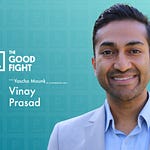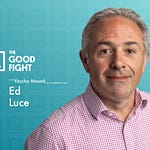In his new book, When The Stars Begin to Fall: Overcoming Racism and Renewing the Promise of America, Ted Johnson offers an optimistic vision for America's future. The only way to overcome racism and build a more just society, Johnson argues, is to build a shared American identity and aim for real mutual solidarity.
In this week’s conversation, Yascha Mounk and Ted Johnson discuss what is going wrong in current debates about race, how to foster civic friendship, and why Americans should remain optimistic about building an inclusive democracy.
This transcript has been condensed and lightly edited for clarity.
Yascha Mounk: How would you describe your book? Do you think you're optimistic or pessimistic about where the country is today and where the country can hope to be 25 or 50 years from now on the question of race?
Ted Johnson: This is absolutely an aspirational book. It is realistic about the challenges of race and liberalism and socio-economic inequality, etc., but it is ultimately optimistic about our chances in this experiment, in this project [of America]. Whether or not we can achieve the thing we say we want to achieve is a whole ‘nother question. I think it is within our capacity to become the thing we want to be. We'll just have to see whether or not the stars align. This is ultimately a test of character—of national character. It is not so much a question of the environment, and whether the environment will permit us to have the country we want, but whether or not we have the fortitude to create and manufacture the nation we want.
Mounk: What kind of society is it that you think we should be aiming to build?
Johnson: It's pretty simple in terms of the idealistic American society. It is egalitarian in the sense that all of us are created equal, as in the Declaration [of Independence], and that we all have these unalienable rights that we can exercise to life, liberty, and the pursuit of happiness. But I don't know if we agree on just those two basic principles yet. I think we are fighting over who has access to these principles, instead of arguing about how we can make them more accessible to more people. The other thing that I really hate about the current conversation about race relations in America is, we're debating about which story of America we should be telling ourselves. Should we be thinking about the horrors of the past so that we don't repeat them? Or should we be thinking about the ideal society, so we've got our eye on the prize and our North Star that we're always working toward? The argument seemed to be where more of our focus should be: on that latter piece of who we want to be, or [on] the former piece of who we were so that we don't return there. What I try to do in the book is draw the arc between these two points and say, “Let's not focus on either point exclusively—let's focus on the arc exclusively.” Let's talk about the progress of a nation over its almost 250 years now, which means we have to recognize the starting point, which is both ugly and beautiful. We have to recognize the ultimate North Star, or the goal society that we want—which is probably unachievable in its purest sense. But the journey there is what makes the project worthwhile—if we're taking this journey together—and if we agree that access to the journey is not a commodity to be hoarded by the few, but one to be spread around.
Mounk: A pushback that might come from the left on this is even on the “ideal” side. What should make us think that the ideal is, in fact, historically motivating, that it's something we should aim towards, that it's something that can have power in the world? I think the cynical view that's very common now is to say, “That ideal was always a fig leaf. It was always a way of cloaking what's actually going on. It was always an excuse for it. So we should give up on it." Why is it that we should hold on to the ideal? Why is that normatively right and practically realistic?
Johnson: The words written at the founding of the country did not accurately characterize the state of the country when they were written. I think everyone agrees on that. The original sin, in my view, isn’t what white people did to black people, but it’s that a nation founded on the principle of equality enslaved people. That natural contradiction was the original sin in my book. But over time, every generation has reinterpreted to a more accurate interpretation of those founding principles. Abraham Lincoln gave new life to the Declaration in many of his speeches. Whether or not the words that Lincoln said in his interpretation of the Declaration was actually what the framers of the founding generation meant when they wrote them is almost beside the point. Because Lincoln gave them new life. Martin Luther King gave both the Bill of Rights and the Declaration new life in his “I have a dream” speeches, etc. Part of the beauty of the American project is that successive generations get to determine how this thing blooms. Farmers can plant whatever seeds they like, but they don't get to determine whether the thing grows, what it grows up to become: Nature, in time, figures that out. I think that's where we are. Even if the founding of the country, in all of its rhetoric, was based in rank hypocrisy, we have reinterpreted it to be powerful. Even those on the left utilize the powerful rhetoric of our founding documents to justify their policy positions, whether it's Medicare for All or tuition-free college. It's not because they want to burn down a nation where all of us are created equal and where we have the rights to life, liberty, pursuit of happiness. It’s that they think these policies actually get us closer to that. Even for those folks who think America's irredeemably racist, I think my sense is they're saying, “In the gap between who we have been and who we profess to be, that racism is the cause for that gap.” But my sense is that as long as we work towards closing that gap, it is proof that the project itself is not irredeemably racist. We can be better than the previous generation in that the project itself becomes less racist, because we say so—because we the people get to determine what this thing looks like in the end.
Mounk: Why is it that we should think of a society of true racial equality as one that all Americans could benefit from?
Johnson: When you look at the book Dying of Whiteness, they talk about all of the different ways that the changing demographics in the country, the changing economics of the country, are actually taking the highest toll on young white men in rural America—where suicide rates are higher than any other demographic, where opioid use is higher than any other demographic. This is a means of coping, or not, with the loss of a sense of social status. It has real material costs for every American. A lot of our leaders know this. They know that as long as they can exploit racial tensions, they actually don't have to deliver a functioning, efficient government to anyone. Because as soon as the public unites and starts demanding the government to do something, they can start pointing at different groups saying, “They're cheating, they're cutting you out. The reason your community is in bad shape is because these people over here are sucking up all your hard-earned tax dollars.” Then the citizenry turns against one another and starts bickering about racism and its existence, and fairness and jobs and pay and all this stuff. Meanwhile, those at the upper echelons with economic and political power get the government to operate to their advantage. So racism becomes a major distraction for the people's ability to provide oversight of its government. If we have a government that derives its power from the consent of the governed, then racism is a way of preventing the governed from ever giving consent, because we're too busy arguing about who that government should be working [for].
Mounk: How would you frame the fight for racial equality in a way that maximizes the chances of people seeing this?
Johnson: I think we have to organize around a collective inclusive identity, and that that identity is juxtaposed against a state that presently is not responsive to any one of us in the way that it should be. In other words, the state is kind of in breach of the social contract. The only way we can bring them back to conform with it is if we are willing to unite and hold the state accountable. If we are not willing to do this, then the only thing that awaits us is a more divided society where conflict is increasingly along racial and class lines, and which will not deliver any bit of the democracy that we want it to deliver: It will be too busy handing out favors and tokens to certain constituencies just to hold on to power. This is what makes the argument so difficult, because I'm asking people to come together over a shared belief instead of a collective self-interest. Instead of saying, “Here's what you gain, here's what I gain, and let's work together so we can both get what we want out of this thing,” I'm saying, “We both get shortchanged in this thing unless we recognize each other's inherent right to the thing in the first place.” The only way we can do that is recognize that we are essentially democratic strangers in this large nation that needs to find a way to establish civic friendship. [...] We may disagree on how to get there or the policies in that perfect society, but we all pretty much agree on the principles that undergird the America that we hoped for.
Mounk: One way of teasing out what you're saying is to talk about patriotism and the importance of that. Where do you see it present today in the United States? Where do you see an absence of it? If we managed to build a society that truly has civic friendship, what would that look and feel like?
Johnson: To the patriotism point, I do believe that there is a place for the national anthem. I'm not one of those folks who thinks reverence of the flag and the national anthem is actually more harmful to the project than the embrace of it. I think it's good for us to have these moments where we come together. I think the most powerful singing of the national anthem ever was Whitney Houston's 1991 “Star-Spangled Banner” at the Super Bowl at a time when the nation was at war. This is a black woman from Newark, New Jersey, whose family was part of the Great Migration out of Georgia, giving the most beautiful rendition of the national anthem—so much so that it became a national bestseller. I think that is an example of how you can hold both your group identities. I don't know if another person could have brought that beauty to a national anthem, which is a part of our national identity, than her at that moment. [...] I think our conception of patriotism needs to expand, to not be so liturgical and so focused on adherence to ritual, and instead focus on the participation in the ritual—even when you're exercising your First Amendment rights in that participation, [and] especially when it's not done in a disruptive way, like Colin Kaepernick. Once civic friendship extends that grace, [then] when Kaepernick kneels or other people kneel, you recognize that as a sign of respect, and an exercise of the very constitutional rights that the flag represents, and pointing out where the nation has fallen short. I think civic friendship is the active part of solidarity, which is what the book is really arguing for: How can we find solidarity with one another across these differences? How can we be civic friends with people in a democracy that [we] will never meet? This is the question, and I don't know how to create this thing. I suggested more civic education and national service and thinking about things like deliberative democracy that mandates people be included in decisions that the government makes or reforms, [like] our institutions and processes. But even if we do all of these things, there has to be a desire to actually be a participant in the America that we profess to want, instead of a combatant in the America that we perceive to be in short supply.
Mounk: As an immigrant to America, I have a slightly different view on what holds America together than virtually all of my friends who were born and raised here. [...] If you look at people who are born and raised in the United States, whatever their ethnicity, whatever their place of birth, whatever their religion, they share a set of common cultural scripts, a set of common cultural references that—as somebody who's new to this country, or was new to this country 10 or 12 years ago—actually appears very, very strong. I wonder whether that lived American culture can be part of that American identity, or whether it is primarily civic and political ideals?
Johnson: I was in the military, which meant I was around a bunch of different Americans from places I've never been—people I never would have met except for the fact that we were stationed together, we deployed together, and we were often together overseas. You get a real sense of what American culture is when you're outside of America, especially with other Americans. When you return to America, just walking off of the airplane and back into the airport, you feel America in a way that you feel foreign when you walk off the plane in another country. You're absolutely right: There is a common culture. There is a sense of America that all of us belong to just by virtue of the fact that we grew up here or that we've been here for so long. In the book, I give a few lessons from the black American experience that I think the nation would be wise to adopt in order to establish this national solidarity. [...] The black experience that I pull out, that we would be wise to adopt, is the social solidarity, which is the solidarity to be found in groups that you didn't choose to belong to, but that you do belong to. By virtue of your belonging, a culture and a connection emanate from it. This is exactly what you're talking about: the social solidarity of being American. For all of the complaints you may have with the country and its governance and its leaders, you know that when you return from Europe or Asia or Africa and land in America, the feeling of stepping into that American airport is familiar. [...] Instead of politicians building on that social solidarity to build unity, they make these rhetorical pleas to it, and then everything after that rhetorical plea divides us along lines of identity because it's politically expedient for politicians. Even in the media, the sensationalism of the conflict of identity is useful or helpful for their business plan, even if it's damaging to the broader American project of bringing us together.
Mounk: What does it look like to foster that civic friendship and that common sense of identity? What can we learn from different kinds of institutions in American society for how to build that civic friendship?
Johnson: The vast majority of folks I worked with in the military didn't join the military because they were bubbling over with patriotism from the womb until their 18th birthday. There are some, but it is not the majority—not even close. Some folks have always just wanted to fly jets, and the military was a way to do that in an economically feasible way. Some folks have always liked the camaraderie and the fraternity of military life, so they joined for that reason. The majority of folks that I've come across, especially on the enlisted side, joined because of the economic benefits that come with military service—like health care and housing benefits and education benefits, guaranteed paychecks, guaranteed housing—and so it is a very pragmatic decision to join the military, often influenced by socioeconomic circumstances. The reason the military is held up as doing a really good job of bringing different people together and establishing bonds is not because they adhere to the same set of values and those values bring them together. It's because these are people who made independent decisions to join the military and then are thrown into these units and exposed to people they would never meet otherwise. And it's the exposure to difference, and being able to break out of the caricature and stereotypes of other groups, and be able to put a face to a conversation, and a smile and laughter and anger to people, [that] helps break down the divisions and the differences between us and create bonds of affection just through the exposure. I think the nation needs to build off that example. [...] If structural racism is defined as the government hating black people, then I think structural racism is not real, because I don't think the government has the capacity to hate. It's not a sentient being: It doesn't care about love or hate, or good or bad, or morality or not. It cares about interests. I don't think America hates people of color. I don't think America hates black people. I do think that the way our society is structured means that for black Americans to achieve the American dream, the hill we have to climb is degrees steeper. The climb is, in real numbers, higher in magnitude than it is for other groups. That is a function of the way our society is structured. It is the government's responsibility to ensure that the climbs for different groups aren't different based on group membership. That is how I think about structural racism. This is not about all of us coming down the hill at the same speed to make sure we have equal outcomes. It's a function of making sure the hill we all have to climb is relatively the same hill.
Mounk: What kind of actions can all of us take to realize your vision of a better America?
Johnson: As long as people are not committed to one another, then the outcome of any policy implementation is likely going to replicate the existence of inequality that was there prior to its implementation, just to a different degree. I think that there is democracy and justice reform that we can do. If there are disparities between who's getting arrested and who gets longer sentences, and who it's really easy for them to vote and who it's really complicated for them to vote, then let's stop doing that. Whatever reforms are required to make the experience more fair and more equal across group differences or group belonging, the better. But this is a project of character. [...] If we don't change a single process, a single institution, from the way it exists today, but we have a change in national character and how we view our fellow citizens and we are willing to go to bat for them when they're being treated unfairly, then the status quo, structurally, probably is okay because the actors within the system are thinking in terms of solidarity. Conversely, if we have perfect systems that run really efficiently but we have a populace that does not see themselves and their fellow citizens, then there is no improvement that we can make to the systems of democracy and justice that are going to get rid of the animus that is still within the populace. [...] Let's figure out the bonds of civic friendship first, because that is what gives us long-term stability and resilience—even as our institutions are weakened and strengthened as time goes on.
Please do listen and spread the word about The Good Fight.
If you have not yet signed up for our podcast, please do so now by following this link on your phone.
Email: podcast@persuasion.community
Website: http://www.persuasion.community
Podcast production by John T. Williams and Rebecca Rashid
Learn more about your ad choices. Visit megaphone.fm/adchoices
Connect with us!
Twitter: @Yascha_Mounk & @joinpersuasion
Youtube: Yascha Mounk
LinkedIn: Persuasion Community
Learn more about your ad choices. Visit megaphone.fm/adchoices















🎧 An Optimist’s Vision of America